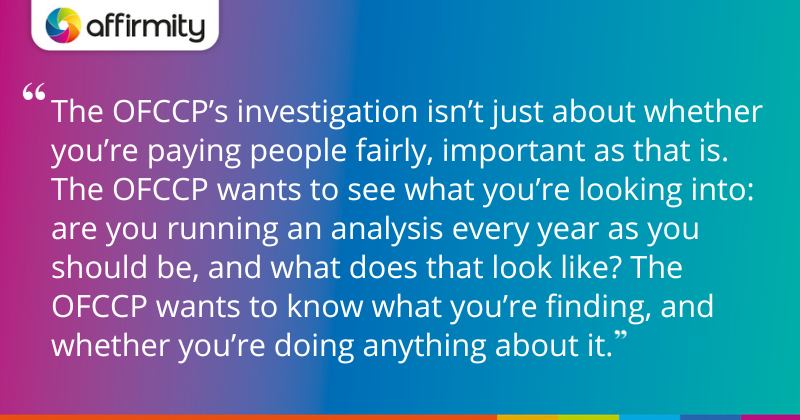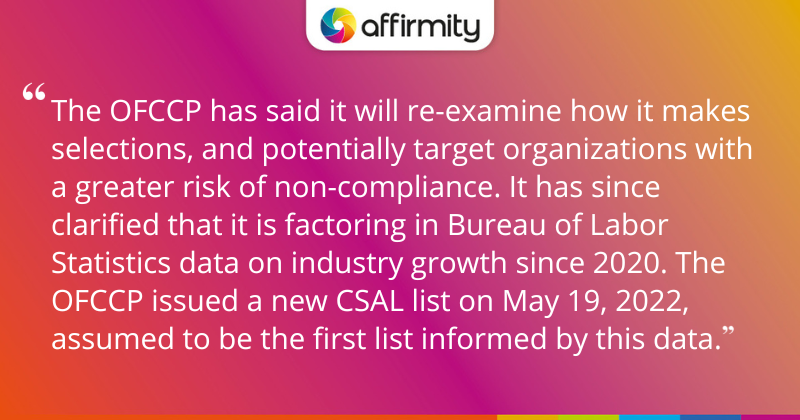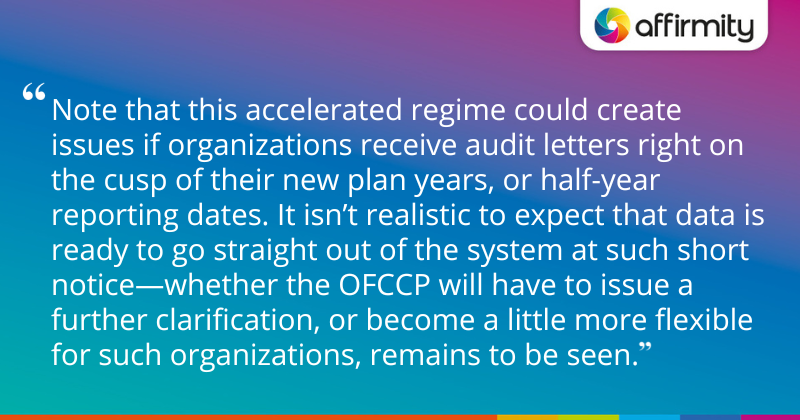The first half of 2022 has been a busy time for the OFCCP in terms of changing priorities and procedures. Announcements big and small have implications for federal contractors whether they’re on the CSAL or just proactively preparing for a time when they will be. In this article, we go over key changes in two recent OFCCP directives—and reveal what you may need to do to ensure you’re not caught out.
Directive (DIR) 2022-01: New Guidance on Pay Equity Audits
Early in 2022, the OFCCP issued a directive “To provide guidance on how OFCCP will evaluate federal contractors’ compliance with pay equity audit obligations and clarify OFCCP’s authority to access and review pay equity audits conducted pursuant to 41 CFR 60-2.17(b)(3).”
When the OFCCP requests contractor data, one of its main requests is Item 19 compensation data, which they will use to conduct a pay equity analysis. The new guidance helps to clarify the OFCCP’s methodology when it investigates contractor efforts toward pay equity compliance.
YOU MAY ALSO FIND THIS USEFUL | “OFCCP Compliance Series: How to Provide AAP Training to Recruiters & Frontline Managers”

How the OFCCP Investigates Pay Equity Basics
The OFCCP’s investigation isn’t just about whether you’re paying people fairly, important as that is. The OFCCP wants to see what you’re looking into: are you running an analysis every year as you should be, and what does that look like? The OFCCP wants to know what you’re finding, and whether you’re doing anything about it.
The directive notes that the OFCCP will most likely ask contractors for copies of data related to the analysis conducted and this should be provided in the usual way. Though the OFCCP hasn’t precisely defined the parameters of a contractor’s pay equity audit, it’s broadly understood to mean, at minimum, some kind of basic review considering race and gender. A full regression or other deep statistical analysis isn’t mandatory—though we would of course encourage such a level of analysis if it uncovered underlying issues you’re trying to investigate.
OFCCP Clarifications on Attorney/Client Privilege
Critically, the directive mentions the issue of attorney/client privilege. It has been standard practice for some organizations to perform pay gap analyses under attorney/client privilege as a fact-finding tool while seeking legal advice on pay equity issues. Earlier statements by the OFCCP had implied that attorney/client privilege cannot be used to withhold pay equity analyses. This was on the basis that contractors are required to conduct such analyses under the regulations, and they therefore constitute records that must be made available during an audit.
The OFCCP has clarified its position slightly, stating that provided that organizations conduct and provide an “acceptable pay equity audit sufficient to demonstrate compliance with 2.17(b)(3)”, they’re not required to produce any separate pay equity audit or analysis created for the “purpose of obtaining privileged legal advice.”
Of course, any pay analysis performed under privilege may uncover issues that the organization then seeks to correct. Ideally, these will be fixed long before the OFCCP audits the business—however, there may still be scenarios in which correction is a work in progress. Again, so long as an alternative, non-privileged pay equity audit has been prepared and is provided upon request, the OFCCP shouldn’t have reason to request your privileged analysis.
IDEAS FOR TAKING DATA FURTHER | “3 Ways to Use Affirmative Action Data to Build Better Business Engagement and Accountability”

Directive (DIR) 2022-02: Effective Compliance Evaluations and Enforcement
Not long after its pay equity-related directive, the OFCCP issued another: “To provide transparency on OFCCP’s compliance evaluation policies and expectations for contractors.” This directive can be viewed as a step back from the flexibility granted due to COVID-19 disruption.
Most importantly, it addresses changes to selection processes and scheduling intended to broaden the scope of who gets selected. Prior to this directive, audits have repeatedly been targeted at some organizations year after year, regardless of whether their establishments have ever been found in violation of employment law.
The OFCCP has said it will re-examine how it makes selections, and potentially target organizations with a greater risk of non-compliance. It has since clarified that it is factoring in Bureau of Labor Statistics data on industry growth since 2020. The OFCCP issued a new CSAL list on May 19, 2022, assumed to be the first list informed by this data.
OFCCP Warnings About Tighter Auditing Deadlines
Beyond these tweaks to the selection process, the directive contains a couple of important changes around the audit notice period. These include:
- Removal of the 45-day waiting period after issuance of the CSAL list. Letters may now be released immediately. This means that anyone named on the list can now expect to possibly have just 30 days from publication of the CSAL list to respond.
- Stricter, post-COVID rules on extensions beyond the 30-day submission deadline. Extensions will now only be offered for extraordinary circumstances such as medical leave, a family death, disaster, military service, or loss of key personnel.
The emphasis on tighter deadlines is partly a consequence of the implementation of the Contractor Portal. As contractors are now self-certifying that they’re compliant and that they have an Affirmative Action program in place, the OFCCP’s position is that flexibility outside of the 30-day notice period is unnecessary—all data should be clean and ready to go.
Note that this accelerated regime could create issues if organizations receive audit letters right on the cusp of their new plan years, or half-year reporting dates. It isn’t realistic to expect that data is ready to go straight out of the system at such short notice—whether the OFCCP will have to issue a further clarification, or become a little more flexible for such organizations, remains to be seen.
FURTHER THOUGHTS ON DATA PREPAREDNESS | “4 Factors That Will Keep Your Talent Acquisition Data Clean for DE&I”

A Reminder About Supplemental Data Requests
Finally, another key feature of this directive is a warning that the OFCCP may request supplemental data after the date of submission, perhaps to cover more recent data not available at the time of submission. Such requests will usually be made when evidence of adverse impact has been found and it wishes to uncover evidence of a broader problem.
In Conclusion—Be Prepared
The increased emphasis on pay equity obligations, as well as tighter auditing deadlines and a shake-up of the CSAL list lead us to a clear conclusion: contractors must ensure they’re running a tight ship, documenting every aspect of their process while being ready to prove the effectiveness of what they do at short notice. Note that Affirmity has also noticed OFCCP officers are more frequently:
- Requesting more data and digging deeper
- Expecting more detailed evaluations of the effectiveness of your good faith efforts and outreach
- Asking for Impact Ratio Analyses (IRAs) (and not just counts)
- Interviewing managers, employees, and witnesses
In this context, it’s essential that you have the right team in place to respond rapidly or provide push-back as appropriate—whether that’s something you achieve entirely in-house or with the support of a team of consultants. Coupled with the right data collection processes and policies, you’ll be able to pass audits with flying colors.
To learn more about Affirmity’s Audit Support Services, please contact us today.
 About the Author
About the Author
Brad Wiltshire is a Manager of Consulting Services at Affirmity. He has 15 years of experience developing Affirmative Action Plans as well as EEO-1, and VETS reports for clients across many industries. A former attorney, Mr. Wiltshire’s legal background has helped him provide ongoing guidance and support for OFCCP audits and other compliance needs. Connect with him on LinkedIn.
